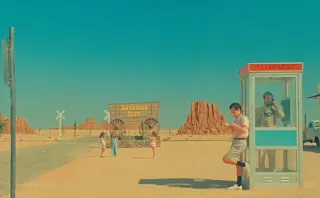Angus Steenbeck, a recently widowed war photographer, arrives with his prodigy son, Woodrow, and his three young daughters in Asteroid City. Woodrow is to receive an award. Their car breaks down, forcing all five to stay behind. Although their mother passed away three months prior, Angus has not yet told his children the bad news. Their neighbours at the chalet are Midge Campbell, a weary star, and her teenage daughter, Dinah. Dinah is also to be honoured at a grand ceremony, which will be attended by renowned scientists and high-ranking military officials.
Friday, 20 June 2025
We are just inventory?
Angus Steenbeck, a recently widowed war photographer, arrives with his prodigy son, Woodrow, and his three young daughters in Asteroid City. Woodrow is to receive an award. Their car breaks down, forcing all five to stay behind. Although their mother passed away three months prior, Angus has not yet told his children the bad news. Their neighbours at the chalet are Midge Campbell, a weary star, and her teenage daughter, Dinah. Dinah is also to be honoured at a grand ceremony, which will be attended by renowned scientists and high-ranking military officials.
Saturday, 23 September 2023
Before and After...
Director: Gren Wells
I do not remember Vinayakar Sathurthi creating such a rave when I was a kid. It used to be a non-event in most households. Nobody wished each other Sathurthi salutations or publicised the day. It was something personal confined to the four walls and entrance to the abode. Now, even those non-celebrants who quite nonchalantly label them as heathens and devil worshipers go out of their way to wish Sathurthi wishes. Is that a recognition or respect?
 All that changed, in my guess, after 9/11. When the world was sliced into two halves - 'those with us and those against us - essentially demarcated by the desert religion, people started wearing their religiosity on their sleeves. It was a survival strategy to delineate themselves from perceived suicide bombers. Through their algorithms, social media further helped create exclusive zones where birds began cherrypicking their own kind till the last barb of the feather.
All that changed, in my guess, after 9/11. When the world was sliced into two halves - 'those with us and those against us - essentially demarcated by the desert religion, people started wearing their religiosity on their sleeves. It was a survival strategy to delineate themselves from perceived suicide bombers. Through their algorithms, social media further helped create exclusive zones where birds began cherrypicking their own kind till the last barb of the feather.
The world we live in is the sum of all these. Just like how a single eruption of Mount Tempora in 1815 transformed the summer of 1816 to cause crop failure, famine and poverty, the 9/11 episode changed how people looked at each other forever. On the cultural front, however, the Lost Summer bred the horror genre Frankenstein and later Dracula.
This sort of coming-of-age movie describes how the 16-year-old protagonist comes to terms with tragedy. Her strained relationship with her mother and her stepfather adds to her misery. She moves in with her estranged father, who leads a too-laid-back life in the not-so-affluent part of Chicago. Love blossoms with a neighbour who is not a parent's idea of a son-in-law.
-
Razakar: The Silent Genocide Of Hyderabad (Telegu, 2024) Director: Yata Satyanarayana In her last major speech before her disposition, Sh...
-
Now you see all the children of Gemini Ganesan (of four wives, at least) posing gleefully for the camera after coming from different corners...
-
https://www.vecteezy.com/free-vector/pig-cartoon Listening to the Muslim convert, Zamri Vinod Kalimuthu, periodically spewing vile over his ...










